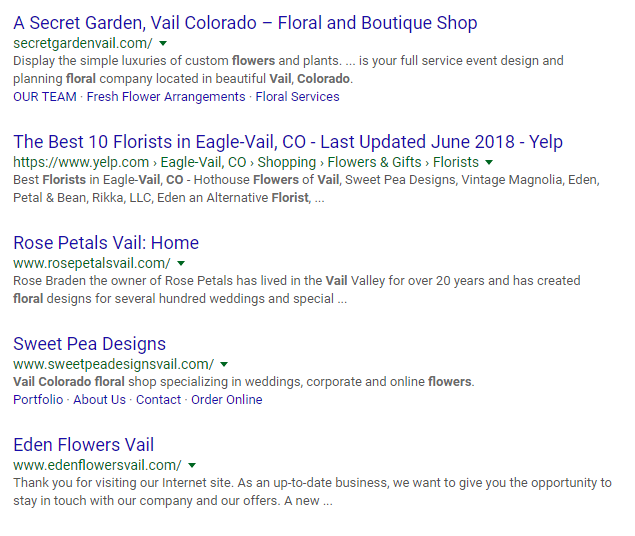
In today’s world, search engine optimization (SEO) shows zero signs of slowing down. The industry’s worth more than $65 billion, with experts anticipating that number to push past $80 billion by 2020. Businesses considering SEO, however, have one big question — how long does SEO take?
Whether you’re a digital marketer or a company looking into SEO, the answer is the same. It depends. While that’s not the answer you’d like to hear as a business (or the answer you’d like to give as a marketer), it’s an honest response.
So, why does SEO come with an undefined timeline for results?
The History of SEO
Back in the day, SEO was lawless. You could rank for a variety of keywords with a variety of black-hat SEO tactics, such as keyword stuffing, backlink spamming, cloaking, and a few more tactics that are now ineffective.
You could do it fast too.
Google changed that — and for the better. With a few notable algorithm updates, such as Google Panda and Google Penguin, the search engine prioritized quality content that was original to the Internet. It also demoted websites that relied on black-hat SEO tricks.
It wasn’t just small, unknown websites caught with their hand in the cookie jar either. J.C. Penny, as well as Overstock, found themselves penalized by Google for using black-hat SEO. While both companies recovered in their search result rankings, it emphasized Google’s indiscrimination.
Later updates solidified the focus of Google, as well as other search engines, on quality content that matched the intention of users. Google RankBrain, for instance, introduced artificial intelligence and machine learning into the mix.
To make a long story short, you have to do SEO the right way to see results.
The Definition of SEO
If you’re reading through this break-down of how long SEO takes and wondering what SEO even is, this section is for you.
Every time you search for a topic on Google, Yahoo, Bing, or another search engine, SEO is working behind the scenes. Companies, as well as bloggers, use search engine optimization to improve their ranking in search results.

Why? Because the higher you rank, the likelier you are to receive clicks from users. In fact, the first listing in a search result receives 33 percent of the user traffic — in comparison, the second listing earns only 18 percent.
If you think about how you search, this makes sense. You probably click on one of the first three search results, and likely never make it to the second page because your search engine, such as Google, delivered the answers you wanted within those top search results.
So, with search engine optimization, you use a whole set of strategies to improve the rankings of your website and its pages. If you think of SEO as a tree, its branches or roots serve as the tools to grow your search result rankings.
A few examples of SEO strategies include:
- Keyword research
- Link building
- Page speed optimization
- Content development
It’s a big area of discussion, so if you want to learn more, you can always browse our SEO audit guide.
The Factors That Influence How Long SEO Takes
In most cases, your SEO efforts won’t show results until you’re four to six months into your campaign. That can vary though, which is why you want to assess where your company and its website — or your client and their website — stands with search engines.
A few factors that influence search engine optimization include:
Website Age
Think of your website as a job candidate. If your website’s only a few months old, versus a few years, you’d expect a company to choose the more experienced professional. That’s often the approach Google takes when assessing which websites to rank in its search results first.
Now, you can boost your competitiveness as a candidate with some SEO strategies, such as link building. Link building describes the process of earning links from external websites — think of them as a reference for your website’s credibility.
If your company writes a go-to article about an industry-specific topic, such as hotels with the best staff, a website that’s publishing a blog post about popular hotels in the local area may link to your content when mentioning hotels with excellent customer service in the area.
Website History
Your website’s credibility, as well as age, also relate to its TrustRank. Like spam filters in your inbox, a search engine doesn’t want you to see results from shady websites. That’s why they evaluate the history of your website and create a TrustRank score.
A higher score correlates to more trust, which is what you want.
Google will often look at four specific pages to assess your initial TrustRank. They include:
- Privacy policy
- Terms of service
- Contact
- About

The search engine giant will also look at the security of your website — HTTPS versus HTTP is the way to go — and the activity of your website. If you’re adding weekly blog posts, for example, that’s a great way to show Google that you’re actively producing quality content.
Earning backlinks can also improve your TrustRank, as you’re receiving votes of confidence from other websites. It’s critical, however, that you’re receiving those votes from websites respected by Google. If they’re spammy, they won’t do your business any good.
Website Penalties
If you’re launching a new website for your start-up or local business, as well as practicing white-hat SEO, you probably won’t have to worry about this potential setback. Depending on your past marketing strategies, however, you may have to cope with penalties.
A penalty results from bad SEO practices.
If your past marketing person, for example, copied content from other websites for your website, you may have received a Google penalty. Even if you resolve a penalty, such as by removing that copied or scraped content, Google will still consider your penalty history when ranking your website.
Because penalties are a manual action — an actual Google employee assigns it — they’re rare. What’s more common are filters, which are a part of an algorithm — like Google Panda — and automatically impact the ranking of your website and its content.
If you launch a page that’s stuffed to the brim with keywords, for example, it’s more likely that a filter will prevent you from ranking, versus a penalty. If you do receive a penalty though, Google will notify you via the email associated with your Google Search Console account.
That’s why it’s best to always follow white-hat SEO practices — they’ll never steer you wrong.
Now that you know some of the factors behind how long search engine optimization, you can understand why you may not see results a few weeks — or months — into your campaign. With that knowledge, you can go into SEO with the right mindset to boost your rankings and revenue.
SOURCES:
https://searchengineland.com/forecast-says-seo-related-spending-will-worth-80-billion-2020-247712
http://fortune.com/2011/02/14/j-c-penney-gets-busted-juicing-its-google-results/
https://findbestseo.com/blog/your-startup-and-seo-audit
https://www.webpagefx.com/blog/seo/google-rankbrain-change-search/ (Optional, can substitute)
https://backlinko.com/link-building
https://www.forbes.com/sites/forbesagencycouncil/2017/11/22/does-google-trust-your-site
https://security.googleblog.com/2018/02/a-secure-web-is-here-to-stay.html
https://findbestseo.com/blog/seo-small-business-how-know-if-you-can-go-it-alone
https://ahrefs.com/blog/google-penalties/